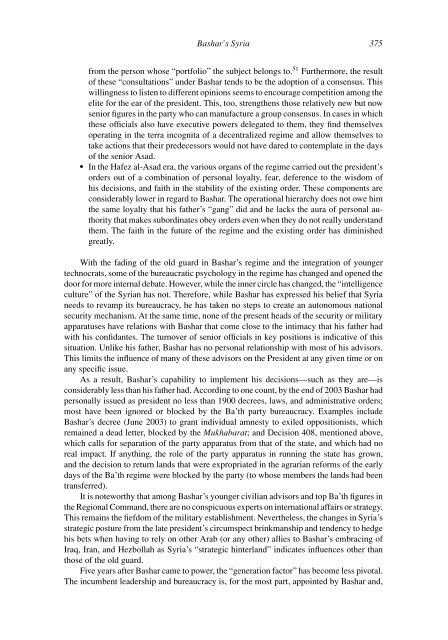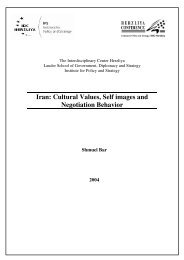Bashar’s <strong>Syria</strong> 375from the person whose “portfolio” the subject belongs to. 51 Furthermore, the resultof these “consultations” under Bashar tends to be the adoption of a consensus. Thiswillingness to listen to different opinions seems to encourage competition among theelite for the ear of the president. This, too, strengthens those relatively new but nowsenior figures in the party who can manufacture a group consensus. In cases in whichthese officials also have executive powers delegated to them, they find themselvesoperating in the terra incognita of a decentralized regime <strong>and</strong> allow themselves totake actions that their predecessors would not have dared to contemplate in the daysof the senior Asad. In the Hafez al-Asad era, the various organs of the regime carried out the president’sorders out of a combination of personal loyalty, fear, deference to the wisdom ofhis decisions, <strong>and</strong> faith in the stability of the existing order. <strong>The</strong>se components areconsiderably lower in regard to Bashar. <strong>The</strong> operational hierarchy does not owe himthe same loyalty that his father’s “gang” did <strong>and</strong> he lacks the aura of personal authoritythat makes subordinates obey orders even when they do not really underst<strong>and</strong>them. <strong>The</strong> faith in the future of the regime <strong>and</strong> the existing order has diminishedgreatly.With the fading of the old guard in Bashar’s regime <strong>and</strong> the integration of youngertechnocrats, some of the bureaucratic psychology in the regime has changed <strong>and</strong> opened thedoor for more internal debate. However, while the inner circle has changed, the “intelligenceculture” of the <strong>Syria</strong>n has not. <strong>The</strong>refore, while Bashar has expressed his belief that <strong>Syria</strong>needs to revamp <strong>its</strong> bureaucracy, he has taken no steps to create an autonomous nationalsecurity mechanism. At the same time, none of the present heads of the security or militaryapparatuses have relations with Bashar that come close to the intimacy that his father hadwith his confidantes. <strong>The</strong> turnover of senior officials in key positions is indicative of thissituation. Unlike his father, Bashar has no personal relationship with most of his advisors.This lim<strong>its</strong> the influence of many of these advisors on the President at any given time or onany specific issue.As a result, Bashar’s capability to implement his decisions—such as they are—isconsiderably less than his father had. According to one count, by the end of 2003 Bashar hadpersonally issued as president no less than 1900 decrees, laws, <strong>and</strong> administrative orders;most have been ignored or blocked by the Ba’th party bureaucracy. Examples includeBashar’s decree (June 2003) to grant individual amnesty to exiled oppositionists, whichremained a dead letter, blocked by the Mukhabarat; <strong>and</strong> Decision 408, mentioned above,which calls for separation of the party apparatus from that of the state, <strong>and</strong> which had noreal impact. If anything, the role of the party apparatus in running the state has grown,<strong>and</strong> the decision to return l<strong>and</strong>s that were expropriated in the agrarian reforms of the earlydays of the Ba’th regime were blocked by the party (to whose members the l<strong>and</strong>s had beentransferred).It is noteworthy that among Bashar’s younger civilian advisors <strong>and</strong> top Ba’th figures inthe Regional Comm<strong>and</strong>, there are no conspicuous experts on international affairs or strategy.This remains the fiefdom of the military establishment. Nevertheless, the changes in <strong>Syria</strong>’sstrategic posture from the late president’s circumspect brinkmanship <strong>and</strong> tendency to hedgehis bets when having to rely on other Arab (or any other) allies to Bashar’s embracing ofIraq, Iran, <strong>and</strong> Hezbollah as <strong>Syria</strong>’s “strategic hinterl<strong>and</strong>” indicates influences other thanthose of the old guard.Five years after Bashar came to power, the “generation factor” has become less pivotal.<strong>The</strong> incumbent leadership <strong>and</strong> bureaucracy is, for the most part, appointed by Bashar <strong>and</strong>,
376 S. <strong>Bar</strong>except for those with family, economic or tribal power bases of their own, beholden to himfor their status. But even the relatively independent status of these “oligarchs” is regimedependent. Unlike many of the “oligarchs” of the former Soviet Union (<strong>and</strong> the presentRussian leadership), who had metamorphosed from Soviet nomenklatura to post-Sovietleaders <strong>and</strong> oligarchs, the <strong>Syria</strong>n elite is well aware that in case of regime change “‘á laMiddle East,” they st<strong>and</strong> little chance of surviving as an elite (or even surviving physically),either collectively or individually. This underst<strong>and</strong>ing underlines the sense of “hang togetheror hang separately” within the regime.<strong>The</strong> ostensibly objective factors of resources (economy) <strong>and</strong> geopolitics are interpreteddifferently by various figures in the elite <strong>and</strong> these differences have a bearing on the entiredecision-making process. Many of the elite see a healthier economy as a sine qua non forregime resilience <strong>and</strong> survival <strong>and</strong> therefore call for economic reforms. Others point outthat <strong>Syria</strong> muddled through the entire Hafez al-Asad era with a sick economy, subordinatingeconomic considerations to those of regional politics (to achieve a strong regional statusfor <strong>Syria</strong>), domestic control, <strong>and</strong> elite cohesion (by providing economic perquisites to theelite <strong>and</strong> denying them to the general public).<strong>The</strong> predominance of regional politics also is debated. While some see <strong>Syria</strong>n regionalrelevance as a necessary condition for creating regional <strong>and</strong> international interest in thesurvival of the regime, others claim that <strong>Syria</strong>’s regional involvement (in Lebanon, <strong>and</strong> Iraq,<strong>and</strong> with the Palestinians) is actually counterproductive to the survival of the regime. <strong>The</strong>price of <strong>Syria</strong>’s support for Palestinian terrorism, Lebanese instability <strong>and</strong> Iraqi insurgency,they claim, far outweighs their benef<strong>its</strong> as tools for maintaining <strong>Syria</strong>’s regional status.It appears that this debate is integrated into the day-to-day decision-making process inDamascus.As a result, the “reading” of communications arriving from foreign powers (includingthe U.S.) is deeply colored by the composition of the people advising Bashar whenthe communication is dealt with. While the <strong>Syria</strong>n ambassadors in Washington <strong>and</strong> Londonare Bashar’s appointees, there is little indication that their reporting or advice carriesenough weight to counterbalance the combined advice of the people surrounding Basharin Damascus. 52 <strong>The</strong> regime’s incompetence in reading strategic conditions was manifestedin <strong>its</strong> behavior toward the Mehlis report. 53 <strong>The</strong>re is no doubt that during the process ofthe Mehlis inquiry, the regime saw it <strong>and</strong> UNSC 1559 as no more than ploys for puttingpressure on <strong>Syria</strong>. It did not underst<strong>and</strong> that it was incrementally losing <strong>its</strong> legitimacy <strong>and</strong>allowing the U.S. to set the stage for even harsher sanctions.Bashar, however, has retained one trait of his father’s policies: an aversion to directmilitary confrontation with Israel. This aversion was amply demonstrated when escalationbetween Israel <strong>and</strong> Hezbollah in the Har Dov/Shab’a area 54 between the Golan Heights<strong>and</strong> Lebanon threatened to spill over into an Israeli–<strong>Syria</strong>n confrontation. Each time thatpossibility appeared, Asad took care not to respond, even to Israeli bombing of <strong>Syria</strong>nmilitary sites <strong>and</strong> a Palestinian training camp near Damascus.Decision making, of course, is only a point on a vector beginning with collection <strong>and</strong>analysis of information regarding important issues <strong>and</strong> ending in implementation of thedecisions. <strong>The</strong> process under Bashar is weak not only in the first stage (collecting correctinformation) <strong>and</strong> in the decision making <strong>its</strong>elf (weighing contingencies <strong>and</strong> consequences,hedging risks, <strong>and</strong> mapping courses) but also in the implementation of decisions.Hafez al-Asad was probably best known for his tough negotiating tactics—long hoursof meetings without any breaks, filibuster monologues on the history of the region, <strong>and</strong>refusal to speak any language other than Arabic. He was, however, also known for hisreliability once an agreement was concluded.
- Page 4 and 5: Bashar’s Syria 355of political im
- Page 8 and 9: Bashar’s Syria 359a-Zur province
- Page 11: 362 S. Barof Lebanon, with which Sy
- Page 17 and 18: 368 S. Barnaturally come with the s
- Page 19 and 20: 370 S. BarSimilar behavior on the p
- Page 21 and 22: 372 S. Bardemocracy” must be foun
- Page 23: 374 S. Barcultural, political and m
- Page 27 and 28: 378 S. Barthe provisions for nonpro
- Page 29 and 30: 380 S. Bar The ups and downs in rel
- Page 31 and 32: 382 S. Barfamily is also linked by
- Page 33 and 34: 384 S. Bar2. The “second generati
- Page 35 and 36: 386 S. BarThe reformist trend withi
- Page 37 and 38: 388 S. Barwould allow the younger g
- Page 39 and 40: 390 S. BarFigure 3. Heads of the Sy
- Page 41 and 42: 392 S. Bar Disruption of the “hie
- Page 43 and 44: 394 S. Bar(Majlis Milli), composed
- Page 45 and 46: 396 S. Bar Other prominent Syrians
- Page 47 and 48: 398 S. BarSyrian civil society—su
- Page 49 and 50: 400 S. BarMany of the Muslim Brothe
- Page 51 and 52: 402 S. BarThese elements find reson
- Page 53 and 54: 404 S. BarIran’s proxy, Hezbollah
- Page 55 and 56: 406 S. BarWest—and specifically t
- Page 57 and 58: 408 S. BarBashar is well aware that
- Page 59 and 60: 410 S. BarBashar did not read these
- Page 61 and 62: 412 S. Bartoken withdrawal while ma
- Page 63 and 64: 414 S. Barlegitimacy had eroded. Ne
- Page 65 and 66: 416 S. Barin the wake of the al-Har
- Page 67 and 68: 418 S. BarIt was Russia, however, t
- Page 69 and 70: 420 S. Baror so, with competitive p
- Page 71 and 72: 422 S. Bar10. According to the well
- Page 73 and 74: 424 S. Bar44. See Flynt Everett, In
- Page 75 and 76:
426 S. Barinternet news site, all4s
- Page 77 and 78:
428 S. Bar100. As one Sunni Syrian
- Page 79 and 80:
430 S. Bar125. Radio Damascus, 21 O
- Page 81 and 82:
432 S. BarBengio, Ofra and Gabriel
- Page 83 and 84:
434 S. BarNews agencies and Newspap
- Page 85 and 86:
Regional Command;Central CommitteeR
- Page 87 and 88:
Main Figures in the Syrian Ba’th
- Page 89 and 90:
Main Figures in the Syrian Ba’th
- Page 91 and 92:
Main Figures in the Syrian Ba’th
- Page 93 and 94:
Main Figures in the Syrian Ba’th
















